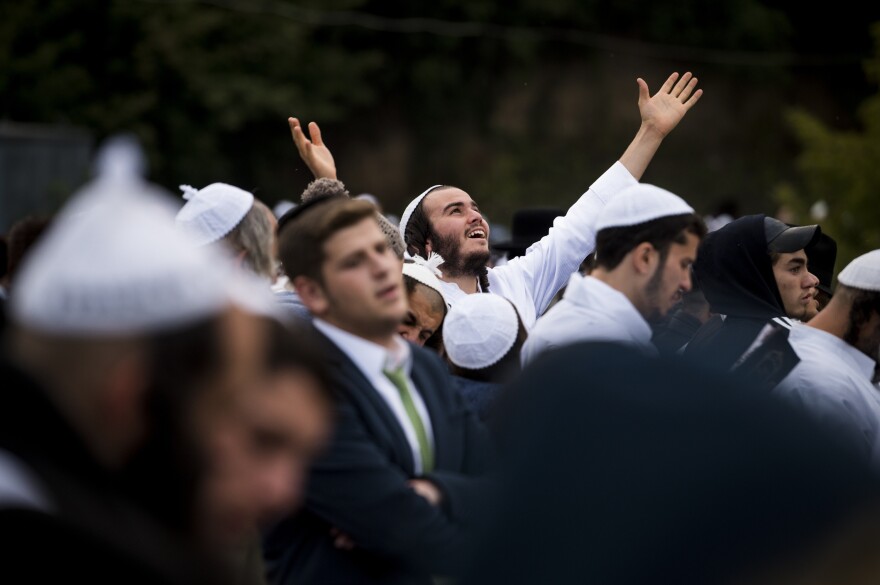UMAN, Ukraine — For all but a week a year, the city of Uman is like any small city in Ukraine. The economy usually revolves around a bus factory and some grain processing facilities.
But every fall, thousands of Hasidic Jews from around the world transform a central neighborhood in Uman to celebrate Rosh Hashana, the Jewish new year.


And this year, despite warnings from their home governments and Ukraine that the country is under invasion and could be dangerous, the festival went on. The crowd was about half the size as other years but still was around 23,000, according to organizers.
Ukrainian street signs are covered up so they can be displayed in Hebrew. Men flood the streets in white robes or long black coats. An array of different head coverings float above the crowds, from modern knit yarmulkes to traditional fur shtreimel hats. The few women who attend the pilgrimage stay separate from the men and declined to be interviewed.

The centerpiece is the tomb of Rabbi Nachman of Breslov, a Jewish mystic who preached his vision of a joy-filled life across Ukrainian lands in the late 18th and early 19th centuries. Followers of the Breslov tradition say that the pilgrimage has gone on since 1811, despite several wars and regime changes.




Pilgrims this year arrived in Ukraine overland because the country's airports have been closed since February.
"I met somebody on the plane to Krakow, so we all shared a car and came together," says Moishe Tisch, who's made the pilgrimage from New York to Uman 10 times. "You don't know if there's going to be food or if you're going to have a place to sleep."


Others arrived via Romania, Moldova and Hungary. Some drove from as far as the United Kingdom. That was despite calls from the governments of Ukraine, Israel and the United States discouraging pilgrims from traveling to Ukraine.
"Given the real threats to people's lives and safety, the Ministry of Foreign Affairs of Ukraine urges Hasidic pilgrims to refrain from this year's pilgrimage," the Ukrainian government warned in a statement.



"People pray to God and have hope in Rabbi Nachman that there will be peace," said Ruven Azran, a member of Uman's tiny local Hasidic community. "We need a miracle in Ukraine."
The closest active conflict is about 200 miles south of Uman, though the city did experience limited air strikes shortly after Russia's invasion. Still, most Rosh Hashanah visitors are unfazed by the air raid sirens that drown out prayers.
"We know what war is. In Israel we have wars on and off all the time," says Yaakov Breslauer, a 35-time pilgrim from Jerusalem. "We are used to it."


Despite rumors that Ukraine's government might drastically scale down this year's pilgrimage, as it did in the first year of the COVID pandemic, local Jewish leaders knew that devoted pilgrims would make their way to Uman no matter what. Before Ukraine declared independence in 1991, Hasidic Jews from abroad snuck into the Soviet Union to visit Uman for Rosh Hashanah .
Still, community groups scaled up their coordination with regional police and foreign tour groups to set expectations for a wartime pilgrimage.
"We want to be good hosts for the Jewish visitors, and make them feel safe," says Benjamin Khmara, a Hasidic Jew and member of Ukraine's Special Forces who managed logistics for this year's Rosh Hashanah .


The downsized pilgrimage did make for a quieter time than in the past — to the relief of many. Though most of the crowds are well-behaved, some drink heavily and there have been fights, brawls and arrests over the years. This year, there was a mostly enforced ban on alcohol and fireworks. Ukraine enforced a nighttime wartime curfew.
"It's good to be home by 11 p.m.," says Breslauer. "You get good sleep at night, you wake up in the morning, you go to service, you pray."

Uman residents have mixed feelings about the time of year when Hasidic Jews visit in droves. This year, some argued that the police officers guarding Uman would be best suited on the front lines of the war against Russia.
While organizers tout the economic infusion visitors bring, the city government has said visitors put a strain on local utilities. In recent years, Ukrainians have complained the festival does not actually feed much money into the local economy because much of it is managed by travel firms based outside Ukraine. A dozen high-rises stand in various states of construction along the festival corridor, with "for sale" signage in Hebrew.
But others welcome the pilgrims' annual presence.
"Their prayers are priceless," says Nazar Bondarenko, an Orthodox Christian who's called Uman home for over four decades. "It doesn't matter what they believe, so long as they want peace and good health for the entire world."
Copyright 2023 NPR. To see more, visit https://www.npr.org.










